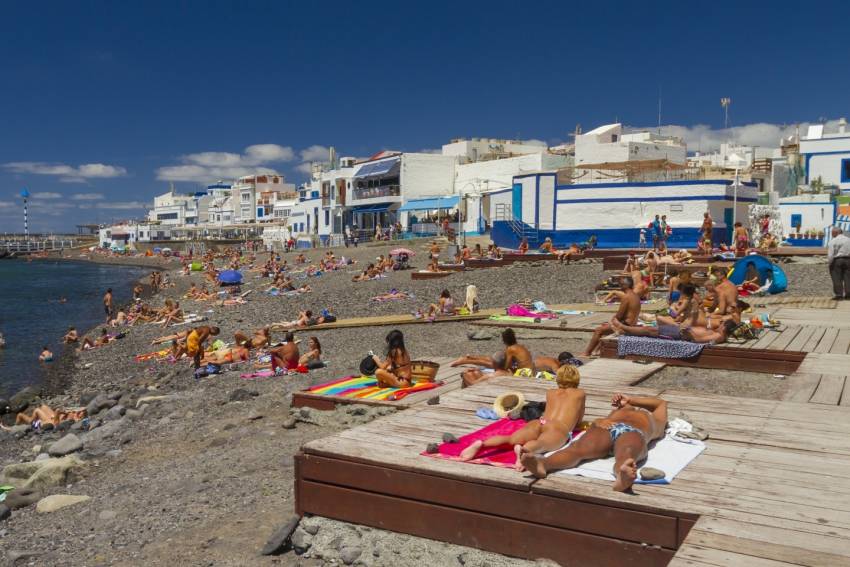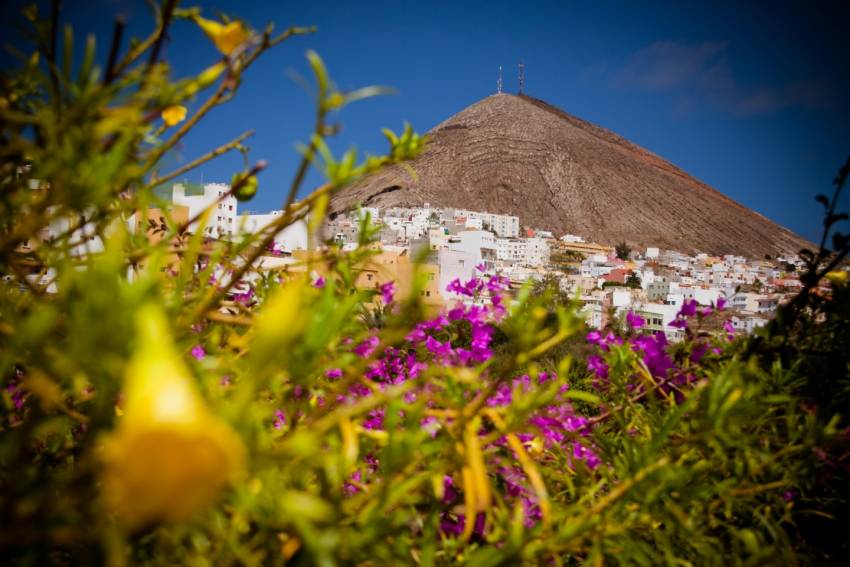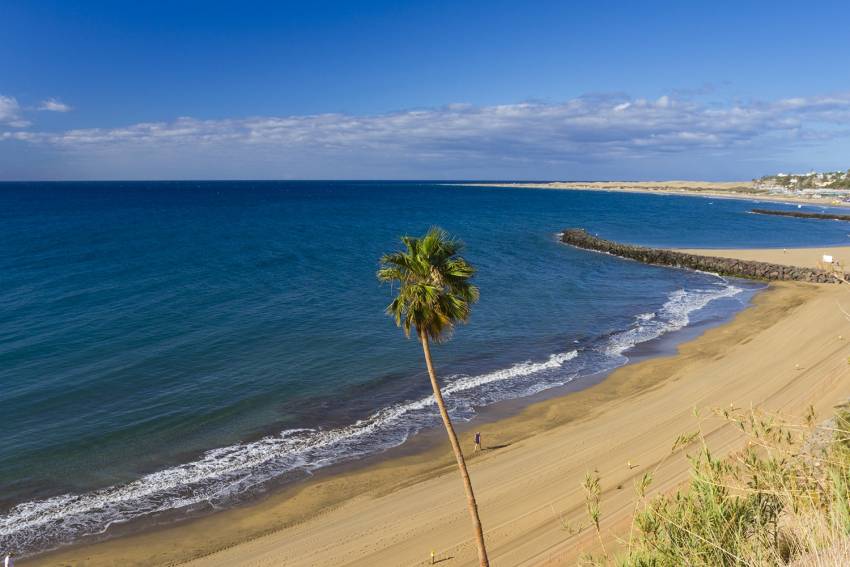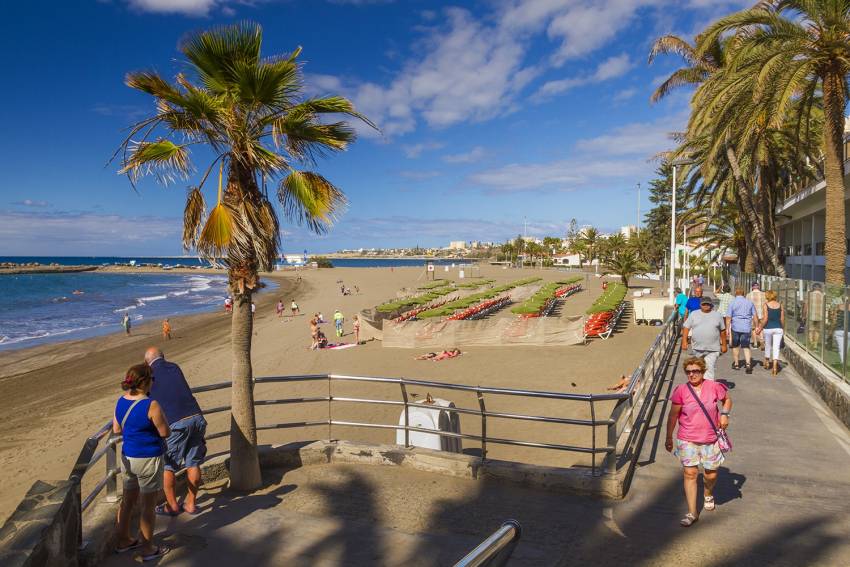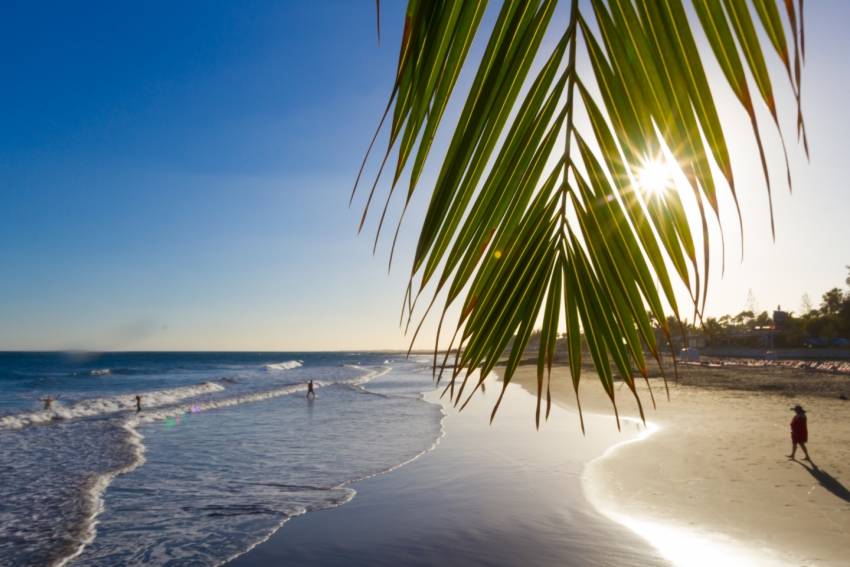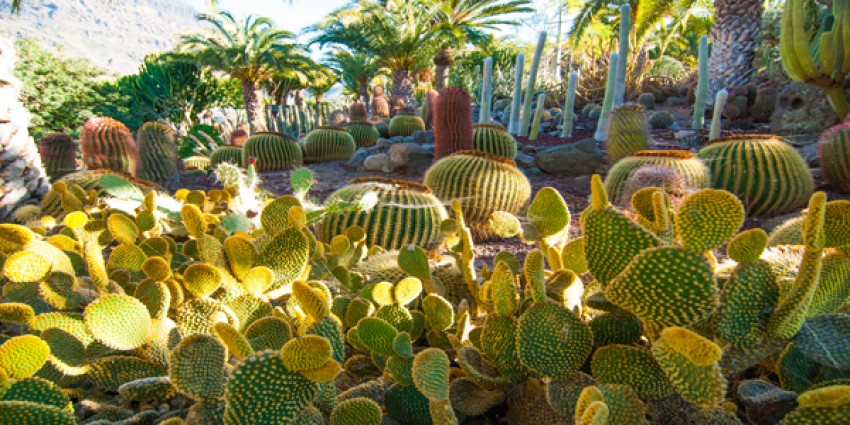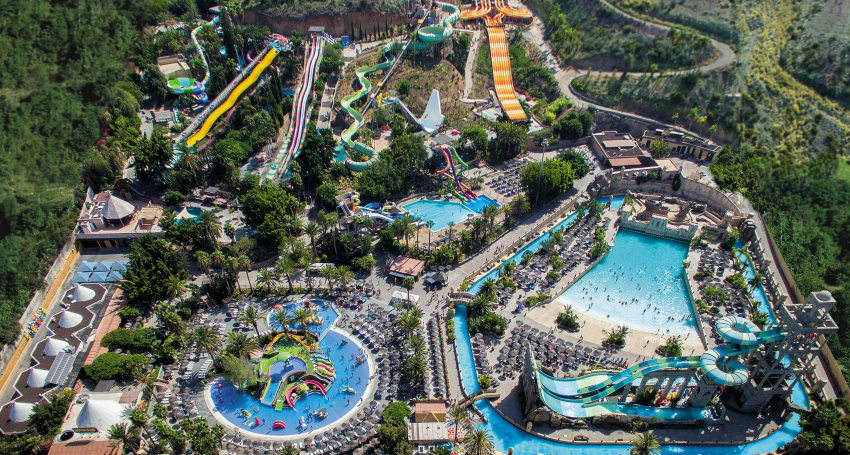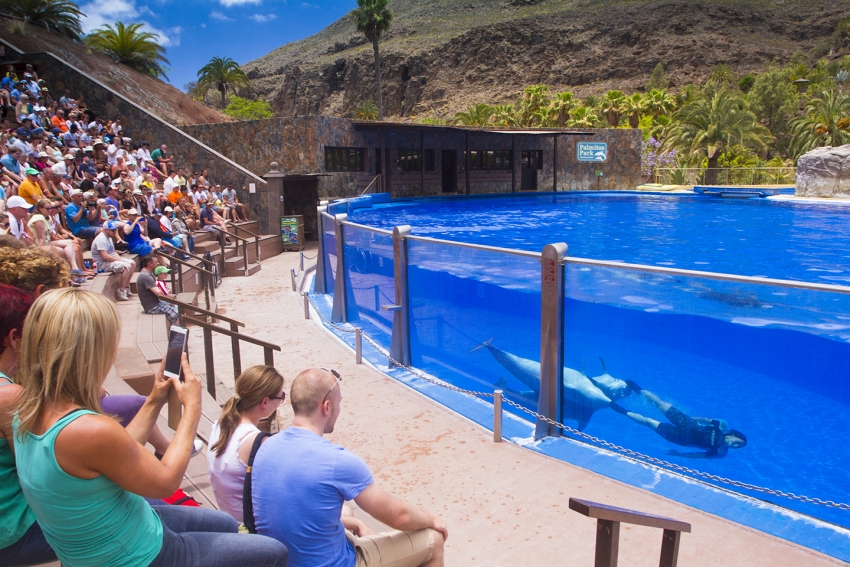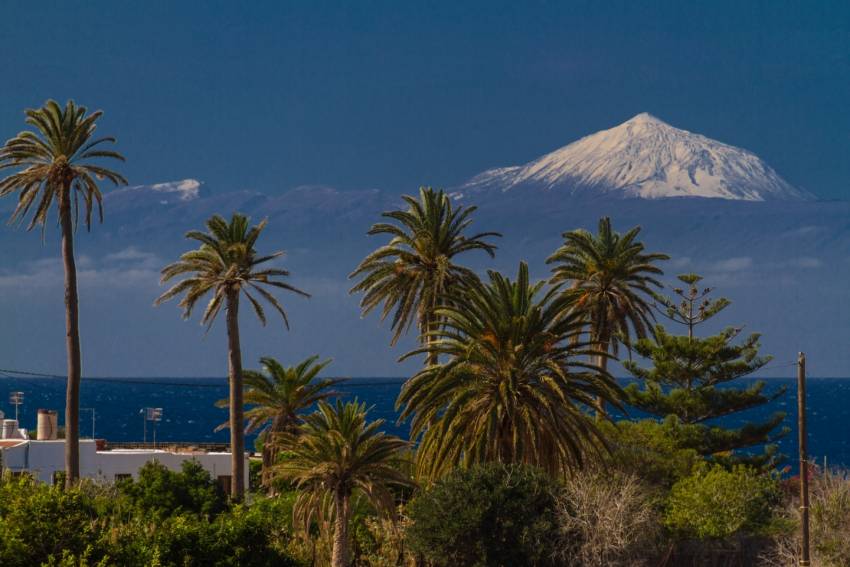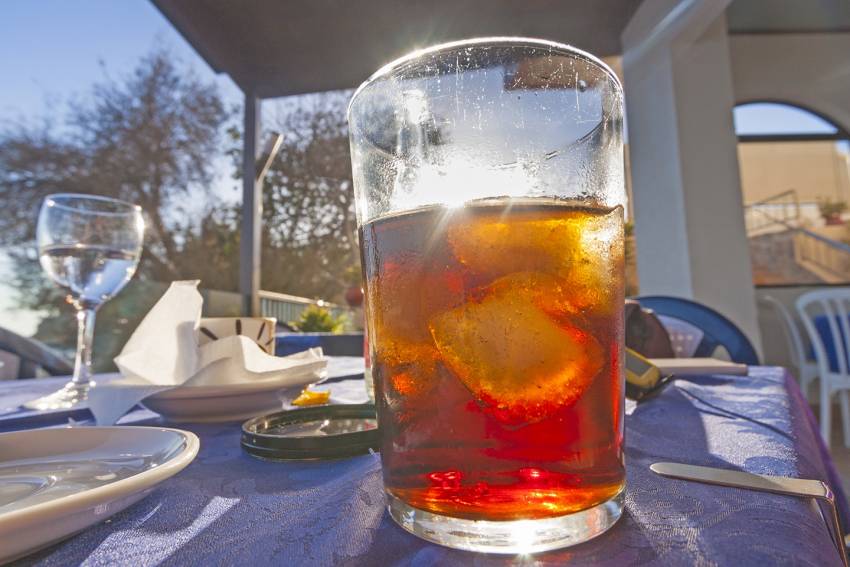Puerto de Las Nieves is the prettiest coastal village in Gran Canaria and while its iconic rock lost its finger in 2005 the village still has its fishy charm. The houses are all whitewashed, the window frames blue, and the beachfront restaurants serve local fish.
And it's sunny: The area has its own microclimate and gets almost as much sunshine as the southern resorts. Even when the whole of the north coast is cloudy, Puerto de las Nieves and Agaete get blue skies.
Things to do and see
Other than eat, swim and relax there's not much (and that's why we love it):
With the locals cramming in at the weekends for a weekend seafood feast, it's best to visit during the week when things are calmer.
Puerto de Las Nieves’ iconic Dedo de Dios (Finger of God) rock sadly lost its finger during a storm a few years ago. You can see the knuckle by looking left from the end of the jetty.
The natural swimming pools, with lava arches and plenty of space to sunbathe, are a great sunset spot.
The famous set of Dutch paintings that give the town its name are in the church, but it's permanently locked.
Most restaurants close in the evening and the nearest bars are in Agaete just inland.
The Agaete Valley behind the town is one of the prettiest in Gran Canaria and is full of traditional houses, palm trees and coffee. The road up ends at the top so you have to drive back the way you came.
Adventurous drivers head from Agaete along the west coast on the spectacular, cliff-edge road to La Aldea de San Nicolas. It’s windy and the drop offs extreme. For those with vertigo, it’s a no-no.
There're several natural, nudist beaches within walking distance.
Beaches
From the town walk up the hill to Turman (a housing estate on the little hill behind the town). Here, a dirt path runs to La Caleta Bay with its pebble beach and rock shelves. There's a set of convenient steps running down to La Caleta. It takes ten minutes to walk from the town up to Turman, and another 15 to get to La Caleta.
El Juncal is another 40 minutes walk past Caleta: It’s a pretty valley with a bigger pebble beach at its mouth. Juncal is clothing optional and often empty as the only way in is on foot or with a four-wheel drive. The walk is pretty dusty, but you get some great views of the coast and the spectacular west coast cliffs. Take food and water as there are no facilities at all at El Juncal. The water is crystal clear and the snorkelling is excellent.
Further away, to the south, is Guayedra Beach: A firm favourite for locals and people from the nearby town of Galdar. The walk from Puerto de Las Nieves has some steep drop-offs and takes about an hour-and-a-half. The beach is mixed sand and pebbles (no facilities) and mostly nudist.
Food
Most restaurants have outdoor terraces with views of the beaches. Until recently they all did seafood stapes like fried fish, calamares, sardines, etc. Now there's a couple of Italian options as well.
Always ask for an ensalada mixta as the Puerto de Las Nieves version always comes with tropical fruit along with the standard Canarian salad ingredients (lettuce, tomato, cucumber, red onion, tuna, asparagus, corn, etc). Order a salad for half the number of people at the table.
The Las Nasas restaurant is the most famous restaurant in town because of its lovely terrace. Arrive at 13.00 at weekends for a guaranteed terrace table. A
The Dedo de Dios restaurant (left of the stone jetty) doesn’t have outside terrace space but is cheap and does huge portions of very reasonable food. It even opens at night.
History hasn't recorded which maniac decided to build Galdar town on one of Gran Canaria's most recent volcanoes, but the result is there for everyone to see. As a long-term real-estate bet, it's not the greatest, but the houses clinging to the steep sides of the cone certainly liven up the view.
CLOSED: The GC 200 west coast road between La Aldea and El Risco closed for good in 2016. The new inland road, now part of the GC 2 is now open. From El Risco until Agaete you can still enjoy the stunning sights from the GC 200.
The West Coast road is Gran Canaria's most dangerous and ridiculous road. It's also one of Europe's top drives with cliff edge moments that have vertigo sufferers clambering out of the windows. It's not for the faint-hearted and if the government has it's way it'll be permanently closed within a few years.
If you like your motoring, it's worth renting a good car for the day just to experience the curves and switchbacks before the route drops into the ocean.
Driving from the south, head inland from Puerto de Mogán and take the turnoff towards Veneguera beach. Then just drive, perhaps with a stop at the green and purple rock stain for a smoothie at the roadside juice bar. Carry on through the Degollada de Tasartico gorge until you get to La Aldea town on the west coast. Drive through the town until you get to the pebble beach ( a great spot for a snack) before heading uphill again towards the Anden Verde cliffs (follow the signs for Agaete and Las Palmas).
Stop at the El Balcón lookout point for a cliff-edge view of the Dragon's tail to the south and the cliffs stretching north to Puerto de las Nieves. Then it's onwards to the highest stretch of road. If you're in any doubt as to the dangers of this road, then the huge rock-catching nets will convince you.
There's nothing along the road except for eye-popping drops and hairpin bends until you reach El Risco village. Stop at the ramshackle bar / shop in El Risco (try the mature cheese: It's as strong as it gets) or walk inland through the village and up the valley to Charco Azul pool and waterfall. You'll wind up every dog in the village but don't worry, they are harmless.
From El Risco carries on to Agaete town with its white houses and faint smell of mangos and coffee. Congratulations; you've done the West Coast road. Now you either turn around and drive it again on the outside of the road, or carry on to Las Palmas and back to the resorts via the motorway.
Warning: This road is often closed during and after rains due to fallen rocks. Do not attempt to drive it during rain! In 2010 a Guardia Civil policeman was killed after a storm while checking to see if it was clear. As of January 2015 bicycles, mopeds and motorbikes are banned on the road.
The road won't be around forever. Plans are afoot for a faster inland route and eventually, the original road will be allowed to drop into the sea. Apparently, its potential as a tourist route isn't high enough to justify the costs of clearing after the rains.
Right on the bounday between San Agustín and Bahia Feliz, this little beach at the base of a cliff is called Pirate Beach but nobody knows why.
Why it's called Pig Beach we'll never know but El Cochino is a great alternative to the crowds of Playa del Inglés beach right next door.
Las Burras beach is the most local of the golden sand beaches in south Gran Canaria and only gets busy at weekends and during school holidays.
South Gran Canaria's popular beaches are packed every day but there are others that, for one reason or another, don't get the same attention. Here's our list of the area's most underrated beaches and why they deserve a visit.
El Cochino
Not one but three small beaches just east of Playa del Ingles that are so underrated that nobody knows their names. Known colectively as El Cochino (Pig Beach) they are calm, sunny and rarely crowded.
The El Cochino beaches are less windy that Playa del Ingles and Maspalomas and sheltered from the waves. Great for families and people who find the dunes a bit too big and a bit too naked.
Patalavaca
It’s small, it’s sandy and it’s always half empty. Patalavaca beach has the warm water and the sunshine of Anfi and Amadores but doesn’t get crowds: Perhaps it’s because you can’t see if from the road, or because you have to walk through a tunnel to get to the sand. Whatever the reason Patalavaca makes it onto our underrated list because it’s a great little beach with seafood restaurants, sun loungers and plenty of space.
Patalavaca is between Arguineguín and Anfi. Access is via the storm drain tunnel under the road. You can also walk to Patalavaca along the coast path from Anfi.
San Agustín
San Agustin resort was the first in south Gran Canaria has faded into semi-obscurity despite its golden beach and loyal hard-core of Scandinavian and German fans: We suspect that they've deliberately taken it off the tourist map by buying all the available property.
The beach is fantastic and rarely crowded. For families with older kids it's great as there's no strong current but often waves to play in. There’s plenty of places to eat near the golden sand and you can even walk to San Agustín beach from Playa del Inglés.
Medio Almud
This is where nudists go when they get sick of the crowds on Maspalomas beach but don't fancy trudging down the dune at Montaña de Arena. It’s low key in the extreme with no facilities but does have a road right down to the start of the beach.
While Medio Almud is more pebbles than sand you can always find a sandy place to put a towel. It's best to leave the big camera at home: Local nudists don’t appreciate snap-happy tourists waving their lenses around.
Pasito Blanco
There’s a beach at Pasito Blanco?
Yes, although getting to it is tricky as you have to park outside the private marina and walk in, or hike down from the road to Meloneras.
The beach is a mixture of golden sand and pebbles and does get crowded with locals in the summer. However, on weekdays it’s a gorgeous, quiet spot and there’s great snorkelling just offshore.
There's no facilities, although you can nip into the marina to the supermarket.
Las Burras
This golden sand beach sheltered by a groyne is where the locals go for a south Gran Canaria beach day. It's between between El Cochino and San Agustin beaches along the coastal walk and has a couple of places to eat. The best bit is at the sheltered San Agustín end by the palm trees as the open end gets windy.
Montaña de Arena
South Gran Canaria's long-standing nudist and hippie hangout is a narrow beach at the base of a giant sand dune between Pasito Blanco and Arguineguin. Access is via tracks and the beach is a 10 minute walk from the GC 500 road.
Take supplies as there are no facilities except for the occassional drinks man.
The locals are happy to share their beach with tourists but some of them object to cameras and video cameras.
While Montaña de Arena is currently pristine the area between the beach and the road is set for development. What that means for the beach itself nobody knows. Enjoy it as it is now while you can.
Puerto Rico beach
It might seem ridiculous to call one of Gran Canaria’s most popular beaches underrated but Puerto Rico gets a bad rap. Artificial, packed with sun loungers and unashamedly resorty it may be, but PR beach is still a cracking place to spend a day in the sun. Ignore the sand snobs and give it a go.
Golden San Agustín beach somehow get's forgotten by the crowds heading for Playa del Inglés and Maspalomas and that's no bad thing. For a resort beach is quiet and laid back and there's plenty of places to eat and drink close by.
If you drive around Gran Canaria, a stop at Cactualdea cactus park is well worth the stop.
Aqualand is Gran Canaria's largest water park and is conveniently located just behind Maspalomas resort. It's a great day out and is opening new attractions regularly in preparation for the new giant water park due to go up in Playa del Inglés.
Palmitos Park is set in twenty hectares of a palm-filled valley just inland from Maspalomas and Playa del Ingles. It started as an exotic bird park but now has everything from komodo dragons to dolphins. Palmitos is a great day out for adults and kids and even when it's full there's plenty of room for everyone.
The Canarian wine scene hasn't buzzed this much since Shakespeare's time. New wineries start up every year and there's always a new wine to try. However, because most wineries on the islands are small you can only buy them close to where they are grown. Great if you have the time and transport but a pain if you're in Gran Canaria on holiday.
Only 70 of the Europe's rarest tree, the Gran Canaria dragon tree (Dracaena tamaranae), survive on the cliffs of the Arguineguin Valley just minutes drive from the island's main resorts.
Most people rent a car in Gran Canaria and have no problems at all. Here's our guide to hassle-free rentals and our advice on choosing a good company and avoiding sneaky tricks.
Tenerife is only an hour from Gran Canaria by ferry and you get to south Fuerteventura in less than three hours. Gran Canaria also has direct overnight ferries to Lanzarote and even boats to mainland Spain. While fares for non-residents aren't cheap, the ferries are a great way to get between islands with a car or a large family.
There are three ferry companies in Gran Canaria: Fred Olsen, Armas and Transmediterranea.
The ferry to Tenerife
Ferries to Tenerife run from Puerto de las Nieves in the north west of Gran Canaria and from the capital Las Palmas. Currently the Norwegian-owned Fred Olsen does the Agaete route (one hour to Santa Cruz plus a free 40 minute bus ride from Las Palmas) while Armas does the Las Palmas route (under three hours). Prices are similar for both journeys.
Look out for Fred Olsen deals that include the ferry ride and tickets to the Loro Parque theme park in Tenerife: They can be great value and you have the option to spend a night on the island next door.
The Ferry to Fuerteventura
Fred Olsen and Armas go from Las Palmas to Fuerteventura. The Fred boat is a fast catamaran and does the journey in under three hours while the Armas is a traditional ferry and takes about four hours to get to Morro Jable in south Fuerteventura.
Technically you can do a day trip to Fuerteventura by catching the early Fred Olsen and getting the late ferry back.
The Armas boat also continues on to Fuerteventura's capital Puerto del Rosario which saves you a long drive if you're he.ading north.
The ferry to Lanzarote
Armas runs a night ferry from Las Palmas to Arrecife in Lanzarote four days per week. It leaves at midnight and arrives early in the morning.
The ferry to La Gomera and La Palma
Where there's no direct ferries to these two island Fred Olsen has a bus link between Santa Cruz and its ferry port in south Tenerife at Los Cristianos. The bus is included in the price and there isn't too much waiting before you're on the ferry to the next island.
The ferry to Spain
Armas runs a weekly ferry between Las Palmas and Huelva in southern Spain using a brand new ship. The journey takes 48 hours and departs on Thursdays. Transmediterranea goes weekly from Las Palmas to Cadiz.
For the latest timetables check the Fred Olsen, Armas and Transmediterranea websites.
Ferries in Gran Canaria come in two different styles: Big ones that travel to other islands, and little ones that hop between harbours along the south coast.
Taxis in Gran Canaria are cheap and reliable and an excellent way to get between resorts and towns in Gran Canaria. You don't have to worry about being ripped off either since all taxis on the island have a meter and the fines for fiddling with it are enormous.
Gran Canaria's buses, called guaguas, come in lots of shapes and sizes and all their timetables are in Spanish. However, once you get the knack of them, local buses are a superb way to explore Gran Canaria.
Three and a half million people come on holiday to Gran Canaria every year, but some people arrive thinking it's next door to Majorca.
The first thing many visitors notice in Gran Canaria bars is the whopping drinks measures. A standard long drink contains between 75 and 100ml of spirits. The standard British single measure isn't enough to wet the ice cubes down here.
Gran Canaria Info recommends:
- Default
- Title
- Date
- Random

